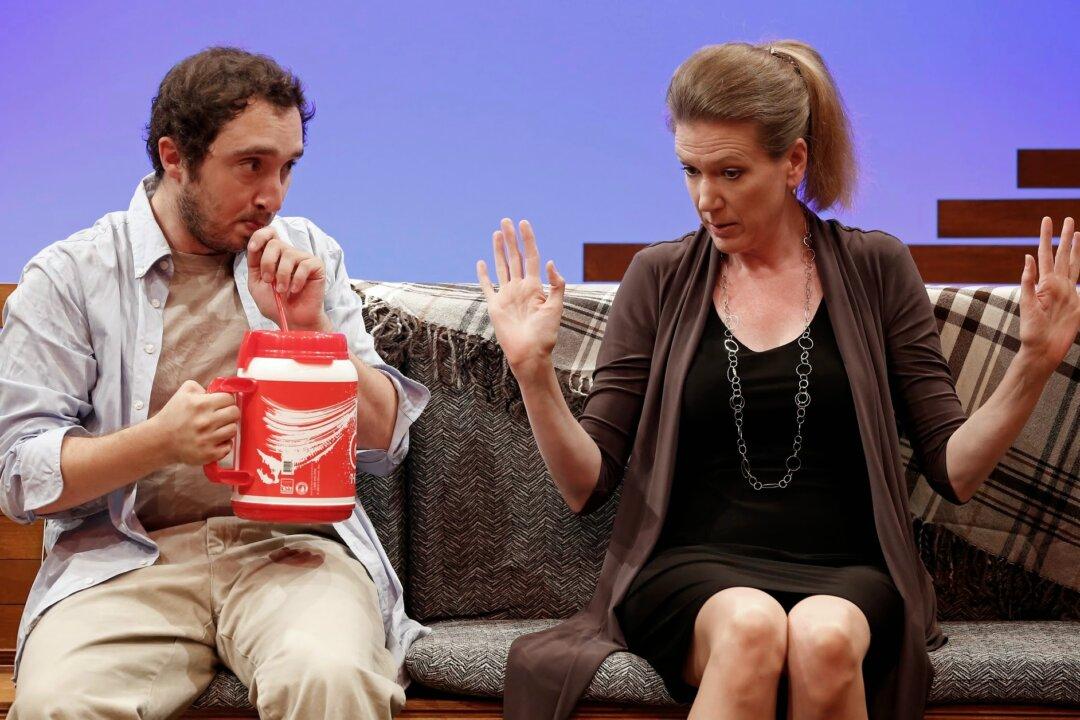NEW YORK—Summer Shorts, the annual collection of one acts, has returned to 59E59 Theaters. Its Series B consists of three works all dealing with moving forward and trying to let go of the past.
‘Napoleon in Exile’
First up is Napoleon in Exile by Daniel Reitz. Corey (Will Dagger) is an autistic 25-year-old who loves video games and has a great head for facts and figures. He’s also slovenly, has a shirt for every day of the week, eats only beige foods, and lives with his mom, Evelyn (Henny Russell).
Evelyn’s main worry is what will happen to her son when she’s gone, an issue that has become immediate because she’s learned she has cancer. Corey, a master manipulator, doesn’t want to deal with this fact.
Yet Evelyn’s determination to face this issue head-on forces mother and son to finally talk to each other and, more importantly, really hear what the other is saying. The result is surprisingly touching, especially as the play’s narrative causes audience sympathy to switch from one character to the other.
Dagger does a great job portraying someone forced to make hard choices for himself—such as going out and getting a job—by the realization that he may lose the crutch he’s depended on for so long.
Russell, meanwhile, is very good as a woman who’s had her own share of problems and is terribly afraid of her own mortality.
Paul Schnee’s direction is excellent, taking Reitz’s words and helping the cast bring them powerfully to life. By the time it’s over, Napoleon in Exile turns out to be something very special indeed—especially in the final moments.
‘The Mulberry Bush’
Immediately following is Neil LaBute’s The Mulberry Bush. Bill (Victor Slezak) is quietly eating lunch in a park when Kip (J.J. Kandel) comes over and sits nearby. It quickly becomes clear Kip has an agenda: getting Bill to stay away from his wife and young son. The latter two sometimes run into Bill in the park.
When Bill refuses to give up his lunchtime sanctuary, Kip threatens to make public the heinous crimes Bill committed in another state—ones he’s since paid his debt to society for.

As Kip makes clear, though, certain things cannot be forgiven.
It’s a testament to the writing that the audience can feel sorry for Bill and even empathize with his situation. He’s accepted responsibility for his past actions and now just wants to be left alone.
Containing more than a few echoes of The Zoo Story, LaBute has written a fascinating look at two people each believing they have the moral high ground in this increasingly volatile situation.
Slezak does a great job as Bill, a man firm in his belief that he should not be punished for something he hasn’t done, regardless of what happened in the past.
Kandel is good as Kip, a man determined to protect his family no matter the cost to himself or anyone else for that matter. Kip is also the harder of the two roles to bring across as it could easily become one-dimensional, but fortunately neither Kandel nor director Maria Mileaf let that happen.
Powerful and thought provoking, The Mulberry Bush could easily be expanded into a full-length work.
‘Doubtless’
With the final play, Doubtless, it’s clear playwright Albert Innaurato has an ax to grind with the Catholic Church, but instead of attacking his subject, he bludgeons the audience.
Doubtless presents a scenario of rampant corruption in Catholicism from the very top down, as described by two nuns (Tasha Guevara and Brenda Currin) who are about to leave the church forever.
From the very start, the play is filled with flagrant sexual imagery and innuendo, not to mention coarse language, as the two women talk about their lives and experiences. Their stories are mainly non sequitur—especially as related by Currin’s character, who is prim and proper one moment, while tossing out four-letter words the next.
It doesn’t help that Guevara and Currin give performances that are completely wooden, as do Andrew Glaszek and David Beck who play two priests attending a debauched gathering. Since every character is a cliché, any chance of eliciting sympathy from the audience is pretty much lost.
Jack Hofsiss’s direction is slapdash; he seemingly has no idea what to do with the material. The end result plays neither as drama, comedy, farce, or anything in between.
Crude toilet humor about Supreme Court Justice Antonin Scalia, former U.S. Senator Rick Santorum, and former presidential candidate Mitt Romney and his wife, Ann, fall flat. A portrayal of Jesus Christ (Dana Watkins) as an oversexed, preening vampire and a scene where Mother Teresa is blamed for the AIDS epidemic are further examples of a writer trying simply to shock an audience rather than explain the reasons behind it all.
Ultimately, the play ends up insulting not only organized religion, but also those who have been hurt by the Church, so thoroughly trivialized is the subject matter.
Whatever point Innaurato is trying to make is lost in a morass of stale jokes, gratuitous obscenities, and writing that’s both lazy and sophomoric.
Fortunately Doubtless is the only play after the intermission, so one can escape that debacle after enjoying two very worthwhile works beforehand.
Summer Shorts 2014: Series B
59E59 Theaters
59 E. 59th St.
Tickets: 212-279-4200 or 59e59.org
Running Time: 2 hours
Closes: Aug. 30
Judd Hollander is the New York correspondent for the London publication The Stage.





